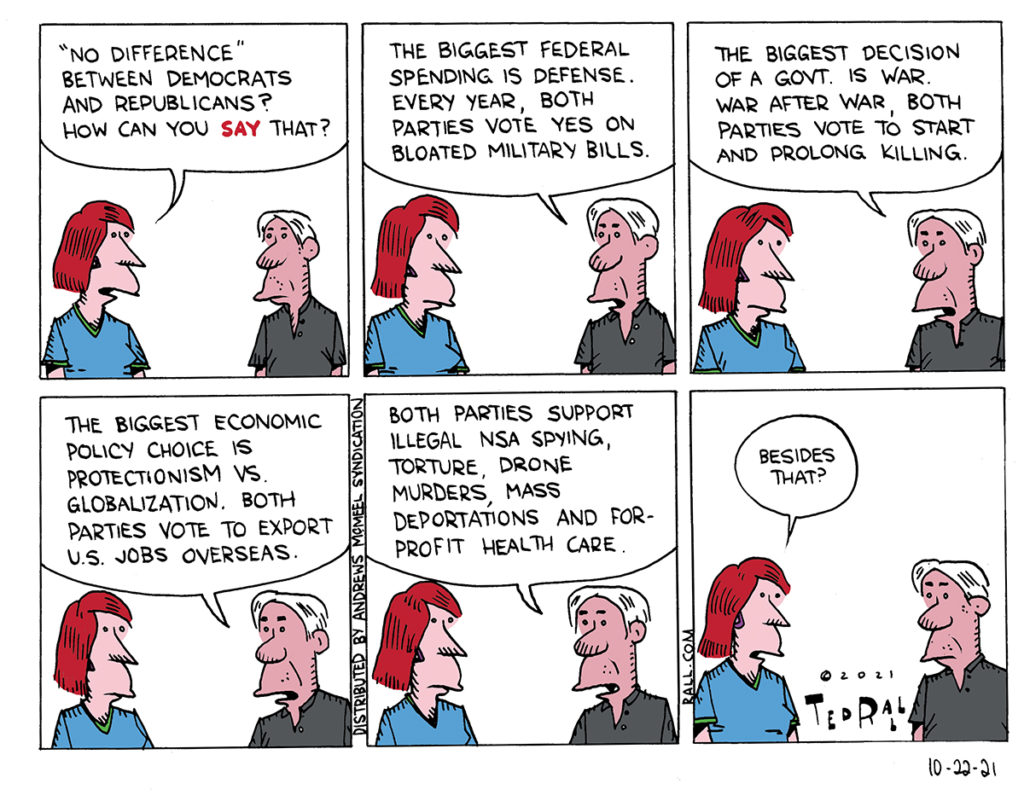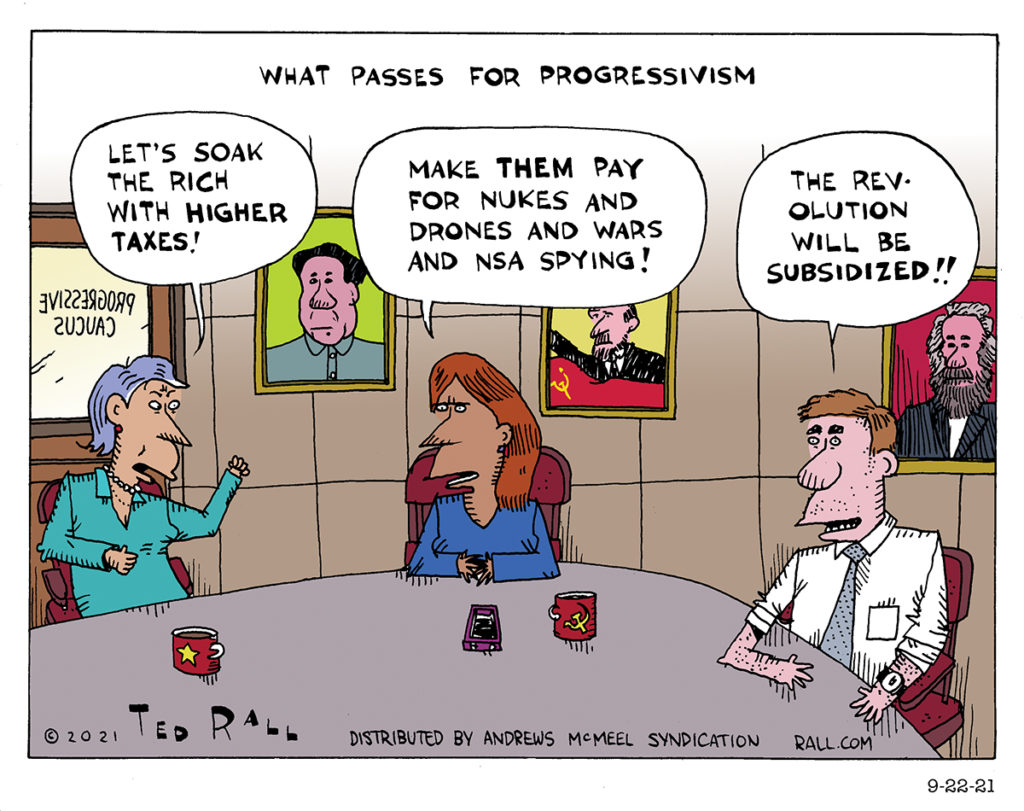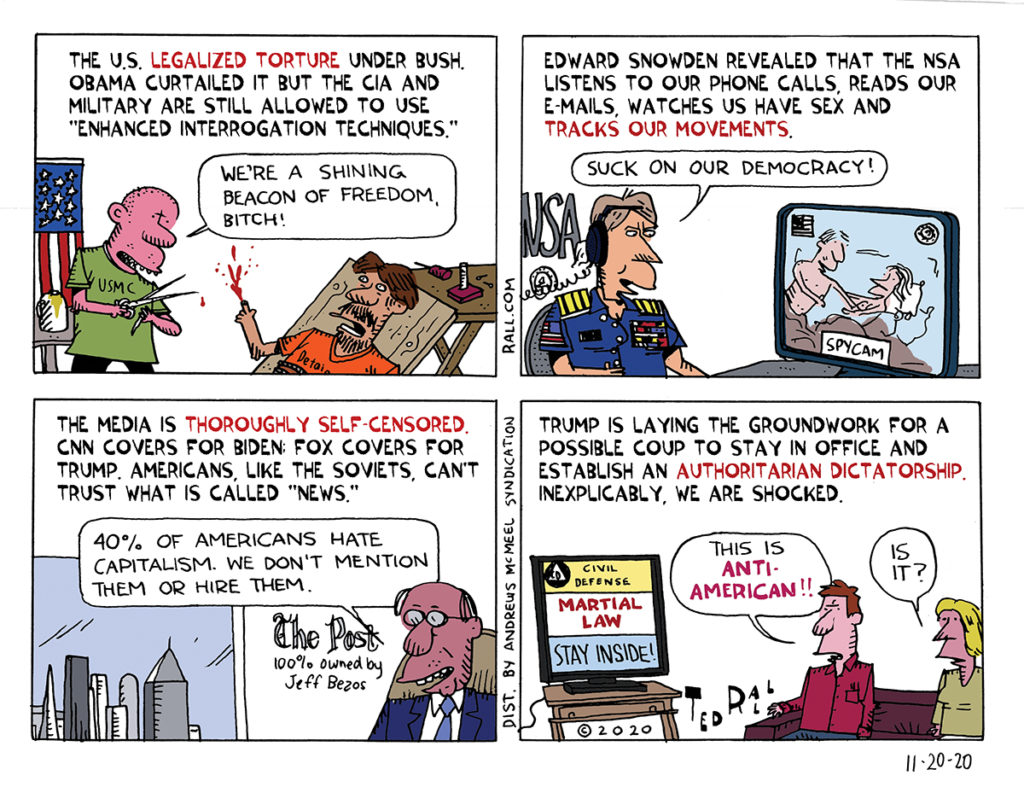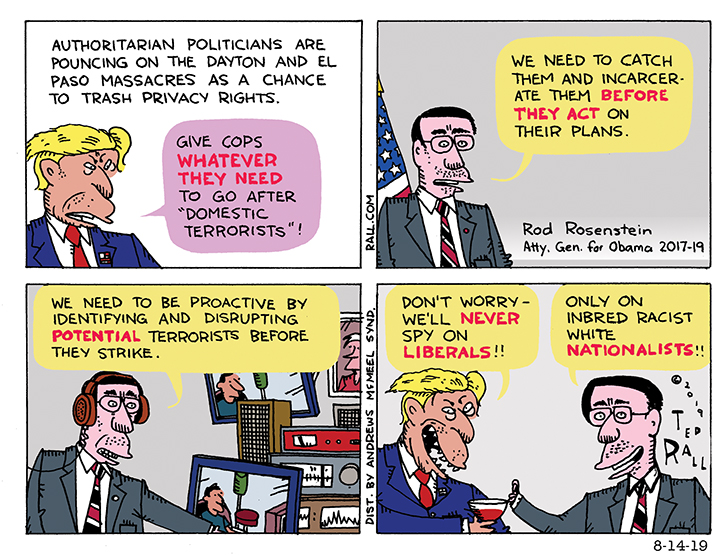 The strange story at the top of the headlines—the current president and the most recent former president are both the subject of special-counsel investigations for taking home classified documents when they left the White House—rests upon two premises. One is patently false. The other is brazenly silly.
The strange story at the top of the headlines—the current president and the most recent former president are both the subject of special-counsel investigations for taking home classified documents when they left the White House—rests upon two premises. One is patently false. The other is brazenly silly.
Americans believe their nation exists in a terrifying state of endless peril. Propagandized by popular culture and the media, we imagine that we’re constantly teetering at the precipice of collapse or subjugation, surrounded by clever and ruthless fiendish enemies hellbent on undermining, attacking and ultimately destroying the United States and turning us into their slaves.
The era of great invading armies and empire-building is over. In our world, borders are largely settled so empires are built via economic influence rather than territorial gains. Bigger countries bump up against each other at the edges in search of incremental advantage.
Fewer nations in history have ever been less at risk than the U.S. in 2023. Buffered by vast oceans and bordered by vassal states, enjoying total command of the world’s oceans, the U.S. is uniquely impervious to invasion. No nation-state has launched a military attack on the mainland U.S. since the War of 1812—and we started that one. (In an attempt to buy time, warn us away from the western Pacific and to convince us to drop our oil embargo, Imperial Japan picked Pearl Harbor as a target because it was located on a remote American colony that was not yet a state. The Japanese didn’t think we would care as much as we did.) The danger to the U.S. is from within: right-wing counterrevolution, secession, disintegration, environmental or economic collapse.
None of the “threats” we worry about—Russia, China, Iran, North Korea—want a war with the U.S., much less to invade. When U.S. adversaries saber-rattle, their motivation is to dissuade us from attacking them. To paraphrase Walter White in “Breaking Bad,” we are not the one who gets attacked. We are the one who attacks.
The hysterical reaction to the classified-documents idiocy rests on a cartoonish worldview derived from watching too many Bourne movies. In the fevered imagination of political-thriller scriptwriters, we would be totally screwed if the wrong Super Duper Important Document were to fall into the clutches of an Evil Enemy of America.
There is no such document.
When, if ever, has a classified document ever been so explosive that it represented a serious threat to national security? Almost certainly never. The exposure of classified material can lead to the theft of technology or the capture or murder of intelligence agents. And when such breaches have occurred, they have been inconveniences that required cleanups and workarounds. They were not existential dangers to the American nation-state. Nuclear launch codes are changed daily, so it wouldn’t even matter if a nefarious foreigner were to nick yesterday’s “gold codes” off the president’s desk.
The problem with classified documents is not the possibility that Donald Trump might, in the ridiculously overheated speculation by mainstream media outlets that ought to know better, sell them to the highest bidder. The problem is that there are too many of them.
Overclassification is wildly out of control. Publicly-available news articles are marked “top secret,” Should we impeach President Biden over keeping some of these next to his car? Description of foreign cultural practices, like wedding ceremonies, are marked “confidential,” so you can be prosecuted as a felon under the Espionage Act for mishandling one. The U.S. government has kept documents classified for a full century; in 2011 the CIA finally declassified World War I-era memos explaining how to expose invisible ink.
“Everything’s secret,” former CIA/NSA director Michael Hayden, remarked “I mean, I got an email saying, ‘Merry Christmas.’ It carried a Top Secret NSA classification marking.”
Get a grip, people!
There would be no effect whatsoever if 99.99999% of classified documents were to be posted to the Internet. Since that’s almost certainly the case about all the documents found in Biden’s garage and at Mar-a-Lago, it would be nice if both major political parties were to drop the posturing over the presidents’ sloppy record management and focus on real problems that affect real Americans every single day: climate change, healthcare for profit, high college tuition, the prison industrial complex, brutal and racist police, unemployment, homelessness, unaffordable housing.
Where would the money come from? We could start by abolishing the unnecessary agencies that churn out those zillions of useless classified documents.
(Ted Rall (Twitter: @tedrall), the political cartoonist, columnist and graphic novelist, co-hosts the left-vs-right DMZ America podcast with fellow cartoonist Scott Stantis. You can support Ted’s hard-hitting political cartoons and columns and see his work first by sponsoring his work on Patreon.)







 Donald Trump wants to
Donald Trump wants to 
 The fight between Apple and the FBI has been framed as an epic battle between big tech and big government. Apple, says the Obama Administration, is siding with “
The fight between Apple and the FBI has been framed as an epic battle between big tech and big government. Apple, says the Obama Administration, is siding with “